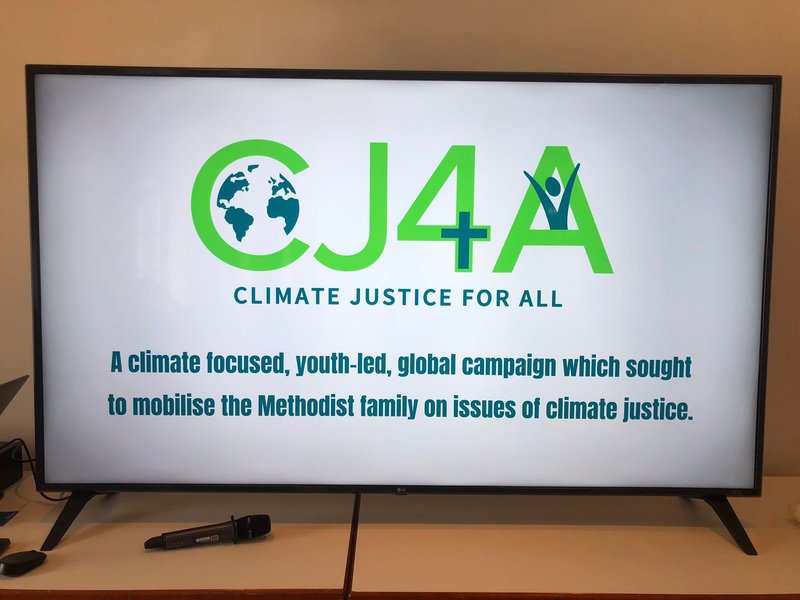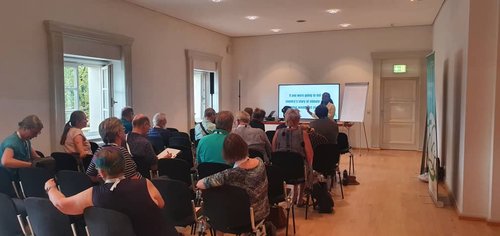15 September 2022
Climate Justice For All – at the World Council of Churches General Assembly, Karlsruhe, September 2022

“We are running out of time. This Assembly is the last chance we have to act to prevent the planet from becoming uninhabitable.”
- The Living Planet: Seeking a Just and Sustainable Global Community, WCC 11th Assembly
As the World Council of Churches General Assembly met in Karlsruhe, Germany, Pakistan was facing the heaviest rainfall in living memory, displacing 33 million people. Europe had just experienced the hottest summer on record.
And yet, in November 2021, world leaders at COP26 in Glasgow failed to deliver the necessary outcomes to respond to the urgency of the climate crisis. The Climate Justice For All project saw six young people lead the Methodist family around the world to advocate for more ambitious, more courageous action from world leaders at COP26. Travelling to Glasgow, they carried with them the stories of their communities, and their global family. They recognised that for true change, those with power gathering in Glasgow needed to be called to account. To listen, to repent, and to change.
The Climate Justice for All global project was supported by the World Mission Fund. To see other innovative projects like this continue to happen please give to the World Mission Fund here.
But it is a long journey, and Glasgow was just one stopping point on the way. Increasingly, the need for an active, ambitious voice calling for climate justice is required at every gathering of power. So, as Church leaders from communities around the world gathered in Germany, the Climate Justice For All team found a place there too. Carrying with them the stories of their campaign, they took on another opportunity to raise the voices of Methodist communities around the world, calling for climate justice for all.
Around 30 participants gathered, along with Jessica Bwali and Iemaima Vaai, Climate Justice campaign workers from Zambia and Fiji. The room seemed determined to focus, and to explore together as they dedicated their time to the workshop. During the session, the group spent some time exploring the different areas of the CJ4A campaign: Listen, Call and Commit.
“The glaciers disappear each year, more and more each year. This means there is no water passing down to the Netherlands and Germany.” – Christian, Switzerland
“From September 2019 to March 2020, we had the longest, largest bushfire in the history of the world. Ash travelled so far it covered New Zealand. This year, in 2022, they are experiencing extreme flooding.” – Amelia, Australia
“People are unable to get clean water. All the things they need to feed their livestock are scarce. In cities the water is not clean, and in rural areas they have to travel far to get any water at all.” – Mary, Zimbabwe

Recognising that each person brought their own story of the climate crisis, we spend time listening to one another. In the midst of a year where extreme weather has affected almost every part of the world, sharing the reality of the climate crisis was a powerful acknowledgement of the reality in which our conversations took place.
“Money talks”
This was followed by a time exploring what it looks like to call on political leaders to use their power for change. I was struck by the optimism of the room at this point, with many recognising that they had the opportunity to speak directly to their elected representatives about climate justice. But there was also the recognition that it was often those with financial power who found it easiest to win a place at the table, and have their story heard. Perhaps the financial barriers of an international conference like the Assembly itself meant that those in the room were also part of this challenge, with voices from the extreme economic and social margins excluded from the space even at the World Council of Churches. These dynamics are complex, and vary from context to context. Yet what remained true was the need for those holding positions of power to be connected to the real life, day to day stories of climate impact, not only in their constituency but across the world. To sit alongside someone sharing their experience, to acknowledge their story, has powerful implications. The relational strength of the church to bring people together in a common space has much to offer here.
“We pray that our prayer will lead to action.”
In the business sessions of the Assembly, the Public Issues Committee of the World Council of Churches made a statement, outlining the actions the WCC would commit to in seeking climate justice. These range from calls for action around fossil fuels, just solutions which don’t disproportionally affect the poorest, and to health and human rights. They also committed to strive towards net-zero by 2040, and to set up new commissions on the climate crisis and sustainable development goals. These wide ranging commitments were ambitious, and recognised the need to respond to the stories and experiences of those on the margins of our global community. But, most importantly, they were rooted in faithful reflection on our calling as followers of Christ. It was here that our workshop closed, as we invited the participants to contribute to a collective prayer for creation, and for climate action. With each member calling out their prayer for creation, together we wrote our prayer for next steps in climate action.
Glasgow, Karlsruhe – both have been opportunities to gather as people of faith and raise our collective voice for change. In November, world leaders will gather again at Sharm El-Sheikh, Egypt, for COP27. Once again, voices of faith will be present calling for Climate Justice For All.
Our Prayer for climate action
We lament that we did not listen to the people who told us years ago that we needed to change, but we did not change.
We ask for forgiveness that we did not listen.
We pray for the victims of this climate catastrophe.
We pray for our trees and forests, for our suffering and dying nature.
We pray for ourselves, that we may find respect for the dignity of all that exists. We cannot lose our connection with the planet.
Please Lord open people’s minds to be ready to change our strategies and habits, that we might build a better future on our beautiful planet.
We pray that we may connect better, to connect on a human level, that we might develop friendships that lead to change.
We pray for the youth, that they will be able to continue their work.
We pray for indigenous leadership, that they might teach us more about care for creation.
We pray for blessing for those working in new climate technologies such as solar and wind power. We pray for their innovation.
We pray for our enemies, for those who do not see that this change might come about because of fear.
We pray for the formal commitments of the living planet statement of the public issues committee of the WCC.
We pray that our communities will seek repentance, that we might be reconciled with our oikos to realise a moment of metanoia.
We pray for God to give us power, that we might be fully committed to climate justice for all.
We pray that our environmental action transcends borders.
We pray that our prayer will lead to action.